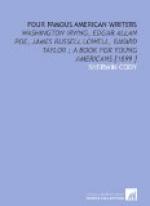Charles Sumner saw the common sense of the poem, but didn’t see the fun in the bad spelling. Said he, “This Yankee poet has the true spirit. He puts the case admirably. I wish, however, he could have used good English.” Evidently Sumner did not suspect that so cultured and polished a poet as James Russell Lowell was the author of a stanza like this:
’Wut ‘s the use o’ meetin’-goin’
Every Sabbath, wet or dry,
Ef it’s right to go amowin’
Feller-men like oats and rye?
I dunno but wut it’s pooty
Trainin’ round in bobtail
coats.—
But it’s curus Christian dooty,
This ‘ere cuttin’
folks’s throats.
The fact is, however, Lowell had written all this, even the letter with bad spelling purporting to come from Ezekiel Biglow. He was deeply interested in the antislavery cause, in good politics and sound principles; yet he saw that it would be useless for him to get up and preach against what he did not like. There were plenty of other earnest, serious-minded men like Garrison and Whittier who were fighting against the evil in the straightforward, blunt way. Lowell was as interested as they in having the wrongs righted; but he was more cool-headed than the rest. He considered the matter. A joke, he said to himself, will carry the crowd ten times as quickly as a serious protest; and people will listen to one of their own number, a common, every-day, sensible fellow with a spark of wit in him, where they would go away bored by polished and cultured writing full of Latin quotations. This is how he came to begin the Biglow papers. Their instant success proved that he was quite right.
Of course it was not long before shrewd people began to see that this fine humor, with its home-thrusts, was not in reality written by a country bumpkin. Through the rough dialect and homely way of stating the case, there shone the fine intellect of a cultivated and skillful writer. The Post guessed that James Russell Lowell was the real author. This was regarded only as a rumor, however, and many people scouted the idea that a young poet, whose books sold only in small numbers and were known only to literary people, could have written anything as good as this.
“I have heard it demonstrated in the pauses of a concert,” wrote Lowell afterward, “that I was utterly incompetent to have written anything of the kind.”
It was early in this same summer of 1846 that Lowell made his contract to write regularly for the Anti-Slavery Standard; and he soon began sending the “Biglow” poems to that paper instead of to the Courier.
The most popular of the whole series of poems by Hosea Biglow was the one on John P. Robinson. Robinson was a worthy gentleman who happened to come out publicly on the side of a political wire-puller. Immediately Hosea caught up his name and wrote a comic poem on voting for a bad candidate for office. Looked at in that light, the poem applies just as well to political candidates to-day as it did then. Here are a few stanzas of the poem. You will want to turn to “Lowell’s Poetical Works” and read the whole piece.




